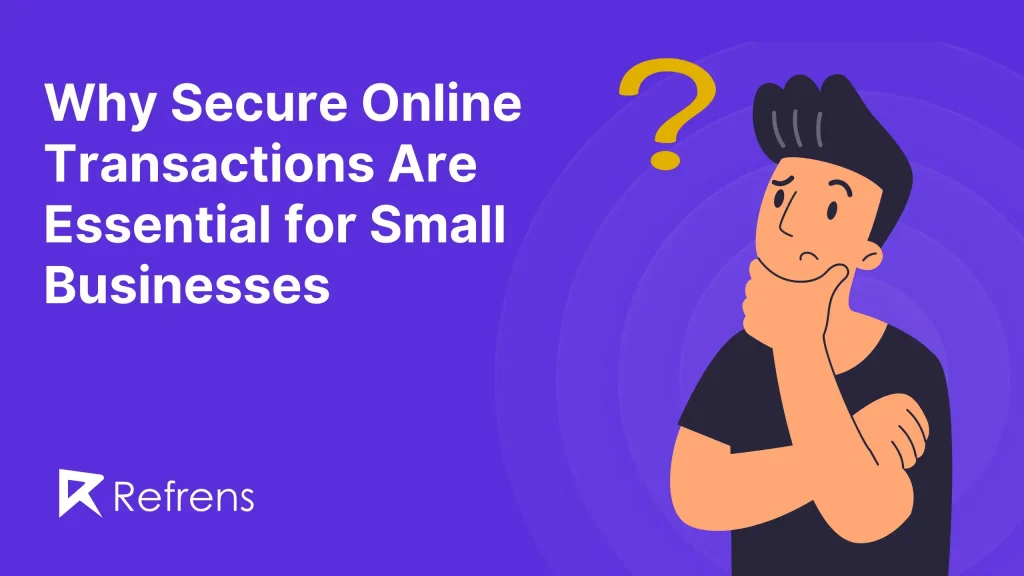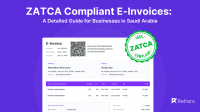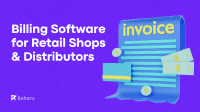Small businesses rely on secure payment processing to keep operations running smoothly and maintain customer trust. Unlike larger companies, small business owners often handle multiple payment platforms, cross-border payments, and various transaction methods, making transaction security even more important. A compromised payment can disrupt cash flow, damage customer relationships, and harm a business’s reputation.
Using accounting software like Refrens helps small businesses manage invoicing, payments, and cash flow more efficiently. Refrens makes it easy to create secure invoices and track transactions, reducing risks and ensuring smooth financial operations.
By combining secure payment systems with reliable accounting and invoicing tools, small businesses can safeguard transactions and protect their reputation.
Let’s explore the risks and how small businesses can safeguard their online transactions effectively.
Transaction Vulnerabilities
All digital financial transactions are exposed to security threats — some visible, others more sophisticated.
Man-in-the-middle attacks, for example, occur when cybercriminals intercept data between your device and a payment processor, especially risky on public or unsecured Wi-Fi.
Other common risks include keyloggers, phishing scams, and compromised third-party payment apps.
For small businesses handling international customers or suppliers, these risks grow: payments may route through several intermediaries, increasing exposure to weak links in the security chain.
Earning and Keeping Customer Trust
Customers today expect businesses, regardless of size, to take payment security seriously.
Small businesses that use secure checkout processes, encrypted connections, and tools like VPNs demonstrate professionalism and care. These practices aren’t just about compliance — they’re about building long-term trust and loyalty. Use this information source to learn more about this tool.
Security failures can quickly erode hard-earned reputations. One breached transaction might not only result in financial loss but also trigger public criticism and lost customers.
In competitive markets, showing you prioritize security can be a key differentiator.
Secure Payment Practices
Here are essential steps small businesses should take:
- Use trusted platforms: Opt for payment processors with robust security credentials, including strong encryption and compliance with industry standards (like PCI DSS). Avoid new or unverified services that may lack established protections.
- Secure your network: Avoid running transactions on public or open Wi-Fi. Use VPNs and maintain encrypted connections to protect sensitive financial information.
- Document every transaction: Maintain clear records of payments, including timestamps, amounts, and confirmation details. This helps resolve disputes and supports internal auditing.
Managing International Transactions
International payments come with additional considerations:
- Currency conversion: Exchange rates fluctuate — timing matters.
- Regulatory differences: Different countries enforce varying financial security laws and standards.
- Platform compatibility: Ensure your payment solution complies with international requirements and has a track record of secure transfers across borders.
Being aware of these variables can help small businesses avoid costly errors and better serve global customers or suppliers.
Guarding Against Fraud
Small businesses are frequent targets of fraud due to their often limited cybersecurity infrastructure.
Common threats include:
- Chargebacks: Customers disputing legitimate payments after receiving goods or services.
- Fake confirmations: Falsified proof of payment can mislead owners into shipping products without receiving funds.
- Credential theft: Hackers gaining access to payment accounts and siphoning funds.
Proactive monitoring and fraud detection tools can reduce these risks significantly.
Planning for Disruption
Every small business should have a response plan for payment issues or breaches. This plan should include:
- Contact info for your payment platforms and banks.
- Procedures for freezing accounts quickly.
- Steps to notify affected customers or partners.
Including clear payment terms in customer contracts — such as when payments are considered final and what constitutes proof of payment — can also provide legal protection.
Enable notifications through banking apps to catch anomalies early.
Investing in Long-Term Security
Security tools may require up-front costs but can save businesses significantly in the long run.
Recommended investments include:
- Encrypted invoicing and payment software
- VPN subscriptions
- Password management tools
- Secure point-of-sale systems
Even small-scale or free security tools can make a difference when thoughtfully implemented. Incorporating managed IT services can provide small businesses with expert support to maintain robust cybersecurity, ensuring payment systems remain protected against evolving threats.
Final Thoughts
Small businesses must stay vigilant and proactive in protecting their financial systems.
By adopting secure payment practices, regularly updating security protocols, and responding quickly to threats, business owners can safeguard their operations, uphold their reputation, and build lasting customer trust.



















